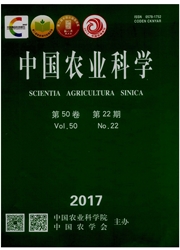

 中文摘要:
中文摘要:
【目的】探讨采前套袋处理对苹果梨(Pyrusbretschneidert Rehd.CV.Pingguoli)果皮蜡质结构和化学组分的影响。【方法】在花后60d对苹果梨果实进行双层套袋处理,通过扫描电镜观察和气相色谱一质谱联用(GC/MS)分析,了解套袋微域环境对果皮蜡质含量、结构和化学组分的影响。【结果】套袋处理苹果梨表皮蜡质含量与未套袋相比差异不显著;与未套袋相比,套袋果实表皮蜡质粗糙、蜡膜不均一、裂纹较多,且表面无蜡质结晶形成。对其蜡质组分分析表明,套袋与未套袋果实检出的蜡质组分数量与种类均存在差异;在含量上套袋果实烷烃较未套袋有所提高,链烷酸有所下降。同时采前套袋处理的果实蜡质组分中饱和链烷酸的碳数分布优势也发生了变化,未套袋果实以C28、C30和C26。的相对丰度较大,而套袋果实仅以C26和C28的相对丰度较大,并未检测到C30饱和链烷酸。【结论】采前套袋处理对苹果梨表皮蜡质超微结构、化学组分种类和链长均具有明显的影响,但其影响机制尚需进一步研究。
 英文摘要:
英文摘要:
[Objective] The objective of this study is to further explore the effect ofpreharvest bagging on micro-structure and chemical composition ofcuticular wax in Pingguoli pear fruit (Pyrus bretschneideri Rehd. cv. Pingguoli). [Method] Pear fruits were bagged with two-layer paper at 60 days after petal fall, ultrastructure and chemical composition of cuticular wax in Pingguoli pear were measured by scanning electron microscope and gas chromatography-mass spectrometry (GC-MS) respectively. [Result] No significant differences in cuticular wax content per surface area between bagging and non-bagging fruits were observed. Ultrastructure of cuticular wax in bagged fruit was rougher, uneven, more cracks and no wax crystals formation compared with that in control fruits. Different numbers and kinds of chemical compounds in cuticular wax of bagged and non-bagged fruits were detected. The relative content of alkanes in cuticular wax of bagged pear was higher than the control, on the contrary, the content of alkanoic acids was lower, and the relative content of alkanes, alhydes and triterpenoids had no difference between bagged and the control fruits. Chain-length distribution of saturated n-alkanoic acids made a difference, alkanoic acids with chain lengths of C26 and C28 were present in higher amounts in cuticular wax of bagged and non-bagged fruits, but C30 alkanoic acids were not detected in the wax of bagged fruits. [Conclusion] These results suggested that preharvest bagging significantly influenced micro-structure, and kinds and their chain-length distribution of chemical composition of cuticular wax in Pinggnoli pear, but the mechanism of action needs to be further studied.
 同期刊论文项目
同期刊论文项目
 同项目期刊论文
同项目期刊论文
 Chemical composition and antifungal activity of cuticular wax isolated from Asian pear fruit (cv. Pi
Chemical composition and antifungal activity of cuticular wax isolated from Asian pear fruit (cv. Pi 期刊信息
期刊信息
